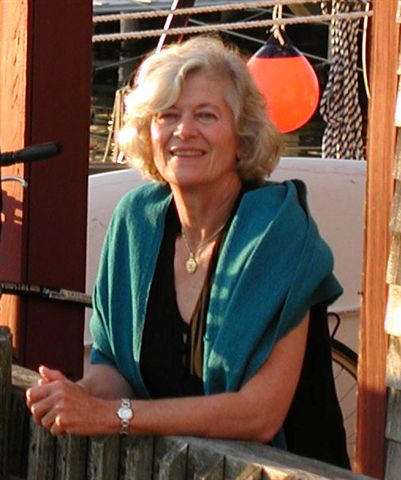More Than Death In Common

by Nancy Nicol
I am writing an historical fiction novel called The Ardent Spirit of Miss Harriet Rice, my great-grandmother’s eldest sister, using primary source material I inherited: wills, deeds and more than a hundred personal letters written to Harriet between 1833 – 1876 from siblings, nieces and nephews.
I lived on and off in Union, Maine, this past year doing research, deciphering old handwriting, and immersing myself in the landscape.
Excerpt of The Ardent Spirit of Miss Harriet Rice:
I got typhus – it was inevitable. I roomed in Friendship for a while, hoping sea air would help me get strong again. I’m partially deaf now, still quite feeble and losing my hair.
At home everyone is sick except Mother: the Bible keeps her going, she says, but I know it’s the jimson weed she smokes at night.
Typhus takes some, others are spared, Doc. Harding said. He predicted I might survive it, which I have, leaving me all the more determined. Despite my body’s rebellion, the fever is lower and delirium less frequent.
When Al and James got sick, we did everything we could to save them. It was their fate and I was almost grateful when death, like a friend, took them from us.
The fact I am alive is my fate, but now I question what Pa calls “God’s will.” For the first time I don’t have the answers… and I am lonely.
Mr. Amos Barrett comes up Rice Hill in a buggy one day – I can hear him outside the window talking to his horse. He’s grieving too – both wife and son also dead from typhus.
Our whole town is a gloomy place of mourning. I hear Mr. Barrett ask to see me. Mother wants him to stay with her a while, it’s not right, she says, Harriet needs rest…but Pa tells his old friend to go right on up.
Gathering all my strength, I prop up against the headboard.
In the darkened room, Mr. Barrett sits near my bed. He has flowers from Sarah. He says he misses Sukey, as I must miss my brothers. She was a good wife for thirty years.
We have death in common, don’t we?
Did I know his father served with Captain Brown’s Minuit Men in Concord? How the Company had strict orders never to fire first…but then fire as fast as they could? It’s what everyone expects of Mr. Amos Barrett, to recount his father’s war story.
I had heard it before. Many times.
I, too, grew up on tales of the fight for independence, how Grandpa Rice heard shots whistle past his head and how he disliked killing, even for liberty.
After that first visit I listen for hoofs on the gravel, a slap on the horse’s rump. I picture his fingers tying the harness to a post. I strain to hear chatting in the kitchen, footsteps on the stairs.
One day he pulls the curtains back – prepared to read poems by Mary Clarke, the mistress of the Duke of York.
“I watched you once at Round Pond,” he says for no apparent reason. “After your swim you lay on the ground and let the sun dry you… before dressing again.”
I swam nude in any pond where water is warmest. When was I there? A lifetime ago, answering my own question. I didn’t care a bit if my friend Sarah’s father saw me naked then or in my present condition – emaciated, bald, a bloodless shell.
His visits cheered me up. I was alive and improving.
“What month were you born?”
“November.” I was thankful to remember it was the nineteenth.
“So, you’re a Scorpio and I’m January Sixth, Capricorn. Scorpios and Capricorns don’t get along very well…but sometimes they do – very well.”
I laughed for the first time in months when he said Cotton Mather called astrology the “brat of Babylon.”
Mr. Barrett brought Emma Willard’s maps and some favorite recipes, translated from French. I’d never heard of the ingredients.
Over the following weeks we discussed polytheism versus true religion, the philosophy of Catherine Beecher, Greek mythology, plants used for medicinal purposes. He agreed – jimson weed was for dulling pain not asthma.
I showed him clumps of my hair. Reminded him of fox fur, he said, regretted trapping fox on his father’s land, tracking them in the snow and selling their skins. Sweet animals.
That day we both cried.
I confessed I thought my broken mirror connected in some way to Al’s death.
He admitted superstitions, too – when our rooster crowed in the doorway he took it as a favorable omen.
Since that day he had ringing in the right ear which meant good news was coming. He took some of my hair and without asking, put it in his pocket which startled me but I didn’t say anything.
A few days later, Mr. Amos Barrett announced he’d sent my hair to Boston, to a wigmaker he knew. He would have to measure my skull.
I imagined what it would feel like, a man’s fingers touching my head. I was hot, blushing. Perhaps my fever returned. Does human desire have a scent of its own? The way deer find each other in the rut? My nostrils flared, inhaling his smoky sweat.
Suddenly he laughed as if he knew. The veins in his neck bulged. “Harriet, when you are up and about, may I take you for a buggy ride to Round Pond?”
Before I could answer, the thought crossed my mind he would try to mount me there like Pa’s breeding bull. Gratefully someone was tapping at my door.
Nancy Nicol is an artist and author living in Wellfleet.
Her stories are included in two collections of personal narratives, Roll 2012 and Reflections 2015, published by Telling Our Stories Press.
Nancy exhibits her paintings at The Works Gallery in Wellfleet, Whydah Museum in Provincetown, the Organization of Independent Artists, Brooklyn, and by invitation, Viridian Gallery, New York as well as juried shows nationally.
Current writing projects include articles for Discover Maine Magazine and a second novel, The Ardent Spirit of Miss Harriet Rice, based on hundreds of letters written to and saved by her great-grandmother’s eldest sister.
You can see Nancy’s art work at: nancynicolart.com



What a treasure you found in these letters. Miss Harriet Rice survivor of typhus and a woman with an amazing life’s journey.